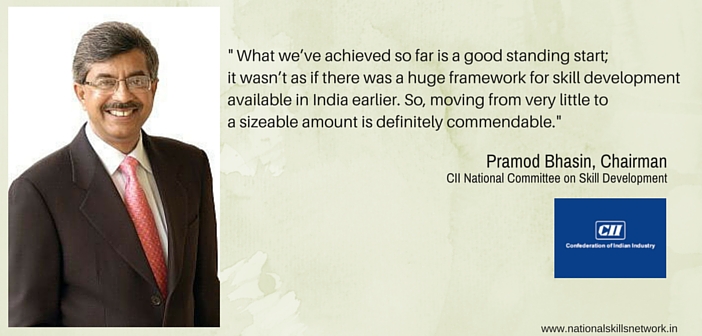National Skills Network – NSN is privileged to present a Skill Talk by Pramod Bhasin, Chairman, CII National Committee on Skill Development, on the positive developments in the skill space in India. Confederation of Indian Industry (CII) plays a crucial role in initiating, anchoring and steering various initiatives in skill development by supporting the industry, the training partners and the government. Reinforcing the strong connect between campaigns like Skill India and Make in India, Mr. Bhasin applauds the great start and emphasizes on the need to consolidate and sustain various efforts to scale up skilling for higher productivity and efficiency.
Early positive signs and results
What’s happening in skill development now is very interesting; a lot of initiatives are being taken up by the corporates, by CII, the Sector Skill Councils (SSCs), the government and the training partners. However, the fact is that we are still in very early days. People really don’t understand how skilling works, the positive side of it, its advantages and so on. It’s good to see the momentum is continuing to build among the training partners and a lot of placements that we are doing across the small and medium sector. The efforts seem promising across India in all the states where we operate. There’s lot of activity and excitement. I think it’s little early and therefore not everybody is seeing the fruits of this yet, but I’m very confident that over time, they would begin to see it.
 Awareness in small enterprises and informal workforce
Awareness in small enterprises and informal workforce
The industry, especially small scale, has to step up and appreciate the benefits of skill based training, upskilling and reskilling. Only then they get to a point where they can take advantage of the productivity that comes from a high level of skills training.
When it comes to the informal workforce, I would say we haven’t adequately addressed these issues in the unorganized sector. One of the reasons is that lot of the skills training being done today is really focused on the services sector. Most of the government funding schemes are linked to demonstrating that people are being employed, only then the training provider gets paid – it is actually quite hard. However, now that the government has launched programs like Recognition of Prior Learning (RPL), I’m sure it will make a big difference in times to come.
Support for the private sector
It’s absolutely necessary for the private sector to step in because without the private sector I’m not sure if this would reach the size and scale that we need. Having said that, it is also important not to put too many rules and regulations in the way of training delivery. In some respects, the government schemes have got so many rules and regulations that it actually inhibits business. There are too many steps and it takes too long. Getting paid is a huge issue for many training partners and the cost of that delay is enormous, especially for smaller training providers who may not have enough capital to sustain.
Other than issues like these, the initiatives from the government have made a fantastic beginning. The efforts put in by the government have made a huge difference already in the overall delivery of training. Let me reiterate, all these things take time. And it is not easy to implement them initially. But I can already see the impact on the industry in general as well as the number of people trained. By now, we have trained hundreds of thousands of people and that is not a small feat.
Making apprenticeship mandatory
On the one side, I don’t like anything mandatory, I think it’s always bad, on the other side, the new Apprenticeship Act offers a great opportunity for the industry. And I wish, in fact, whole of industry takes it up. Because, this gives an enormous opportunity to get to know their employees, to train people, to take them on board, without perhaps some of the earlier issues that were faced with regard to apprenticeship. One of the reasons why not enough apprenticeship training is happening is because even the students are unaware of its benefits. This can be addressed in two ways: one, at CII, we are going to encourage everybody to comply with the new apprenticeship law and two, create awareness among students about the benefits of apprenticeship and its importance in their careers. Things will positively change when the industry takes the ownership to train and provide a good strong career through this mechanism.
Sector skill councils (SSCs)
SSCs have already contributed a lot. And it is important to remember how new all of this is – they are barely five years old. So, the amount of progress made has been tremendous. We sometimes forget to thank the people who have made it possible from both the government and NSDC and similar organizations who have brought us this far.
SSCs have a huge role to play since the quality of what we do still needs to improve across the board. Their contribution is valuable in terms of setting the curriculum, providing the content frameworks, the certifications standards because that ultimately will drive the huge demand for quality training. And once you get quality you also get productivity.
Demand forecasting for skilled workforce
There is an urgent need to collect relatable and good data across districts and industries — today we have a lot of data but it remains quite generic in some respects — it should be linked with salaries earned and jobs available.
I still feel we need better and focused data; it can’t be as broad a category as shortage of people. It’s also important to ensure that along with this data, we track a couple of other things: one, productivity – is there an increase in the overall earnings for those people who get trained? Two, how many people are getting trained in what categories and where are they finding work. Do employers also see a difference in the capability of people they are able to hire?
Multi-skill centers and the industry linkage
It’s a good initiative from the government to address the skilling needs of the industry and it helps in two ways: it makes sure that your focus is far more on quality and it prepares you to establish different industries and train people in those trades. It would also force people to meet certain standards in quality and efficiency which may not be possible in small training centers. Most importantly, not being focused on low hanging fruits like the services industry alone, it would encourage training in a wide variety of industries. We will have to see how this develops.
CII Global Summit on Skill Development 2016
It’s very exciting to see the event getting bigger and better every time, with more participation and engagement. It just shows the excitement around skill development and growing awareness. I hope we can show new and different things, new ways of doing business and training. I hope we can show the industry how the quality of the output is improving substantially with efforts in skilling. That would be great if we can do it.














Sir Nsdc me fashion designing course hai kya